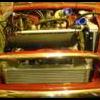
Vavles And Valve Seats
#1

Posted 09 January 2011 - 11:22 PM
He shows the ideal angle for valves and valves seats to be 30 deg as opposed to the original 45 deg seat angles.
Now I understand all the physics and maths but can you buy 30 deg valve seats and can you just machine normal valves for this process.
Something tells me it's not going to be that simple but I can't for the life of me figure out why not?!
#2

Posted 10 January 2011 - 04:05 PM
I've always thought that the ideal shape for a valve seat was a curved radius with the valve just 'kissing' the seat. I also thought that the reason for multi-angle seats for competition engines was to give just a slightly wider valve to seat contact width to improve the valve/seat life as a fully radiused seat width of just a few thou would not last too long (maybe 2 races?)..
Has Mr. Viz. now changed to 30 deg as the ideal and if so, I wonder what the airflow science is to justify this? Maybe extensive dyno tests have proved this to be the case.
One might think that for reliability on a regularly used engine the normal 45 deg seats are still best.
I, too, am interested in this. I guess there is nothing wrong with grinding the valve edges to give a 30 deg angle, but is the expense worth it in terms of performance gain. I mean, if the gain is, say, 2 bhp at certain revs it's hardly worth it unless it's a racing engine.
#3

Posted 10 January 2011 - 04:13 PM
#4

Posted 10 January 2011 - 05:06 PM
He states that a 30 deg cut seat and then multiple back cuts after the seat into the port gives the same throat shape and sizes as can be expected with a 45 deg seat.
The reason for the 30 is the curtain area opened up after the valve is lifted, which is basic maths when you look at it. The acuter seat provides better airflow as the valve opens due to the properties of air. If you give air a small bend of say 10 deg to flow over, it treats it as a curve or radius. These small cutbacks give the ability to shape a larger port which gives better airflow at max air velocity. Best of both worlds. The new angle in the seat would give better ft lb. If I remember correctly he said it can give 10 - 15 % increase in torque in a standard 1275.
But like you said, it's all about the money.
#5

Posted 10 January 2011 - 05:20 PM
In guess that it won't be long before there will be a 'Rimflow' inlet valve at 35.6 mm with a 30 deg angle and then we'll all be using them. If the actual seat width at 30 deg were to be made about 0.030" that would give some reasonable reliability. Then the combustion chamber side could be either radiused/blended into the chamber or machined at, say, 10 degs, with the throat side cut at 45 degs, then just blended smoothly into the port.
I think I'll try that when the valves become available. I've always blended the chamber side of the 45 deg seats into the chamber, but 30 degs will be just as easy to do.
"I feel the need, the need for more speed!"
#6

Posted 10 January 2011 - 06:47 PM
Obviously a lot of the benefits of the extra flow will be lost if the valve doesn't seat correctly.
A 30 degree seat doesn't flow much more than a 45 at high lifts, but at low lifts the gains are quite large.
#7

Posted 10 January 2011 - 07:17 PM
The valves won't become available cooperman, this is not new.
The reason it isn't used by head modifiers (unless you ask for them) is reliability, especially now-now-a-days with unleaded fuel. After you've carried out this mod, the actual valve seat will be at most half the thickness of a 45 degree seat.
Why will the seat be half that of a 45 degree ?
#8

Posted 10 January 2011 - 07:36 PM
#9

Posted 10 January 2011 - 08:02 PM
And the angle does make a HUGE difference in terms of torque.
I agree that the sealing will not be as effective as a 45 degree seat but then again we're talking about performance down to the last component. Racing performance.
In terms of a daily drive with good reliable power it's pointless and not worth the cost.
In Cooperman's rally 'S' it'd make a difference where he'd feel it. Remember we're talking engines that get stripped down every few races.
#10

Posted 10 January 2011 - 08:24 PM
We're talking about a valve with a 30 degree seat to begin with, not a backcut 45 degree valve.
#11

Posted 10 January 2011 - 09:04 PM
I don't see why the seats would have to be thinner DILLIGAF?
And the angle does make a HUGE difference in terms of torque.
I agree that the sealing will not be as effective as a 45 degree seat but then again we're talking about performance down to the last component. Racing performance.
In terms of a daily drive with good reliable power it's pointless and not worth the cost.
In Cooperman's rally 'S' it'd make a difference where he'd feel it. Remember we're talking engines that get stripped down every few races.
Have a look at the diagram I just uploaded, as you can see where the 30 degree cut takes away part of your existing 45 degree seat.
By the way, I know it works, I was simply explaining why it isn't seen that much except in competition.
I didn't mean to patronise, the second part was meant in return to bmcosse's comment.
I think you're getting confused. The diagram you posted purely shows a 45 degree valve with a 30 degree "backcut" this is used to narrow the seat on standard valves to improve flow.
We're talking about a valve with a 30 degree seat to begin with, not a backcut 45 degree valve.
And yes this is what I was thinking of also.
#12

Posted 10 January 2011 - 09:17 PM
its all in the big yellow Vizard book, pages 206-209.
30 degree seats have been around for ages the reason they're not widely used is due to poor sealing of the valve against the seat. The steeper angle of the 45 degree valve sort of wedges it in place on the seat, but the 30 degree seats don't do this as well. If you get what I mean ? Lol As the valve seat expands differently around its radius when hot {hotter at the thin part next to the inlet} this causes poor sealing. The valve head can be modified to allow the seat to expand under heat, this helps the valve conform to the head better.
Obviously a lot of the benefits of the extra flow will be lost if the valve doesn't seat correctly.
A 30 degree seat doesn't flow much more than a 45 at high lifts, but at low lifts the gains are quite large.
#13

Posted 12 February 2022 - 09:24 AM
After some testing on the flowbench I’m sold on the idea of giving them a try, but I’m interested in the longevity compared to a 45 deg seat.
Phil.
#14

Posted 13 February 2022 - 03:54 PM
Old thread revival & a long shot I know, but has anybody ever run with 30deg seats?
After some testing on the flowbench I’m sold on the idea of giving them a try, but I’m interested in the longevity compared to a 45 deg seat.
Phil.
I can't help with the 30 degree seats but I had some once in a life time luck recently, I was allowed to poke about a torn down mercedes F1 N/A V10 engine and ask as many questions as I like, what I can say is that it didn't have 30 degree valve seats, the seats weren't particularly thin and the ports weren't spectacular, if I'm honest it was just like a high end motorcycle engine but on a larger scale but with a different operating system.
As a man in your position with all the goodies and knowledge, give it a crack, what's the worst that can happen.
Shooter
#15

Posted 13 February 2022 - 06:03 PM
I’m not surprised the F1 engine wasn’t running 30deg seats though. The advantages are at low lifts so will typically suit our application much more.
Phil.
1 user(s) are reading this topic
0 members, 1 guests, 0 anonymous users

















